12 start with J start with J
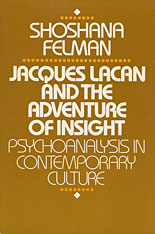
Jacques Lacan, one of the most influential and controversial French thinkers of the twentieth century, was a practicing and teaching psychoanalyst in Paris, but his revolutionary seminars on Freud reached out far beyond professional circles: they were enthusiastically attended by writers, artists, scientists, philosophers, and intellectuals from many disciplines.
Shoshana Felman elucidates the power and originality of Lacan’s work. She brilliantly analyzes Lacan’s investigation of psychoanalysis not as dogma but as an ongoing self-critical process of discovery. By focusing on Lacan’s singular way of making Freud’s thought new again—and of thus enabling us to participate in the very moment of intellectual struggle and insight—Felman shows how this moment of illumination has become crucial to contemporary thinking and has redefined insight as such. This book is a groundbreaking statement not only on Lacan but on psychoanalysis in general.
Felman argues that, contrary to popular opinion, Lacan’s preoccupation is with psychoanalytic practice rather than with theory for its own sake. His true clinical originality consists not in the incidental innovations that separate his theory from other psychoanalytic schools, but in the insight he gives us into the structural foundations of what is common to the practice of all schools: the transference action and the psychoanalytic dialogue. In chapters on Poe’s tale “The Purloined Letter”; Sophocles’s Oedipus plays, a case report by Melanie Klein, and Freud’s writings, Felman demonstrates Lacan’s rediscovery of these texts as renewed and renewable intellectual adventures and as parables of the psychoanalytic encounter. The book explores these questions: How and why does psychoanalytic practice work? What accounts for clinical success? What did Freud learn from the literary Oedipus, and how does Freud text take us beyond Oedipus? How does psychoanalysis inform, and radically displace, our conception of what learning is and of what reading is?
This book will be an intellectual event not only for clinicians and literary critics, but also for the broader audience of readers interested in contemporary thought.

James Jackson Putnam was an established sixty-three-year-old Boston physician and Harvard professor of neurology when he and William James traveled to Clark University to hear Sigmund Freud's lectures on psychoanalysis. Putnam had become interested in psychoanalytic theory three years earlier in 1906; and, in 1908, his interest had been renewed when he met Freud's first English-speaking follower, twenty-eight-year-old Ernest Jones. It still surprised and even disturbed his friends, however, when Putnam became Freud's first American convert as well as a founder and first president of the American Psychoanalytic Association in 1911, and of the Boston Society for Psychoanalysis in 1914.
Of the 172 letters in this volume 163 are published here for the first time. All of the letters present new perspectives on the origins and early development of psychoanalysis in the United States. They provide the first documentary account of the founding of the American psychoanalytic organizations and the battles that surrounded the first public presentations of the psychoanalytic cause in Europe and America. They dramatize the extent to which Freud and Jones used Putnam as a confidant and how important Putnam's Yankee fairness, objectivity, and personal integrity were to the movement.
It is intriguing to discover how these men, long before formal training centers were established, educated each other by mail and learned by letters how to handle psychoanalytic problems never recognized or encountered before. Theory was debated as well, and the 89 letters between Putnam and Freud indicate how Freud's increasingly disillusioned stoicism clashed with Putnam's New England optimism and formed the basis for a significant dialogue on the nature of man, ethics, and the psychoanalytic mission. The letters suggest that Putnam encouraged Freud's interest in the analysis of conscience and of religion that Wilhelm Wundt and Carl Jung had earlier awakened. Nathan G. Hale, Jr., in an introductory essay, provides the background and the explanation for the surprising role Putnam played in what he came to call the "cause." Marian C. Putnam, who made the unpublished letters available, has written a warm recollection of her father. Judith Bernays Heller, Freud's niece, has translated the German texts, which are also published in the original German.

Drawing on multiple interconnected scriptural and spiritual sources, the Jewish tradition of ethical reflection is intricate and nuanced. This book presents scholarly Jewish perspectives on suffering, healing, life, and death, and it compares them with contemporary Christian and secular views.
The Jewish perspectives presented in this book are mainly those of orthodox scholars, with the responses representing primarily Christian-Catholic points of view. Readers unfamiliar with the Jewish tradition will find here a practical introduction to its major voices, from Spinoza to Jewish religious law. The contributors explore such issues as active and passive euthanasia, abortion, assisted reproduction, genetic screening, and health care delivery.
Offering a thoughtful and thought-provoking dialogue between Jewish and Christian scholars, Jewish and Catholic Bioethics is an important contribution to ecumenical understanding in the realm of health care.
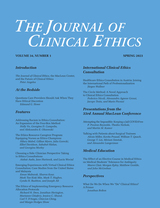
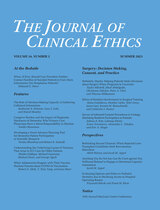
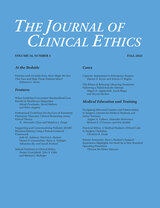
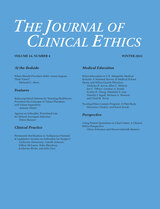

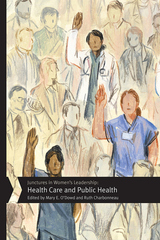
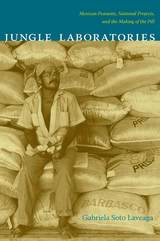
Soto Laveaga traces the political, economic, and scientific development of the global barbasco industry from its emergence in the 1940s, through its appropriation by a populist Mexican state in 1970, to its obsolescence in the mid-1990s. She focuses primarily on the rural southern region of Tuxtepec, Oaxaca, where the yam grew most freely and where scientists relied on local, indigenous knowledge to cultivate and harvest the plant. Rural Mexicans, at first unaware of the pharmaceutical and financial value of barbasco, later acquired and deployed scientific knowledge to negotiate with pharmaceutical companies, lobby the Mexican government, and ultimately transform how urban Mexicans perceived them. By illuminating how the yam made its way from the jungles of Mexico, to domestic and foreign scientific laboratories where it was transformed into pills, to the medicine cabinets of millions of women across the globe, Jungle Laboratories urges us to recognize the ways that Mexican peasants attained social and political legitimacy in the twentieth century, and positions Latin America as a major producer of scientific knowledge.
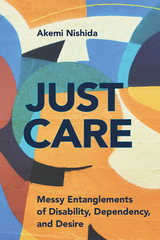
Just Care is Akemi Nishida’s thoughtful examination of care injustice and social justice enabled through care. The current neoliberal political economy has turned care into a business opportunity for the healthcare industrial complex and a mechanism of social oppression and control. Nishida analyzes the challenges people negotiate whether they are situated as caregivers, receivers, or both. Also illuminated is how people with disabilities come together to assemble community care collectives and bed activism (resistance and visions emerging from the space of bed) to reimagine care as a key element for social change.
The structure of care, Nishida writes, is deeply embedded in and embodies the cruel social order—based on disability, race, gender, migration status, and wealth—that determines who survives or deteriorates. Simultaneously, many marginalized communities treat care as the foundation of activism. Using interviews, focus groups, and participant observation with care workers and people with disabilities, Just Care looks into lives unfolding in the assemblage of Medicaid long-term care programs, community-based care collectives, and bed activism. Just Care identifies what care does, and asks: How can we activate care justice or just care where people feel cared affirmatively and care being used for the wellbeing of community and for just world making?
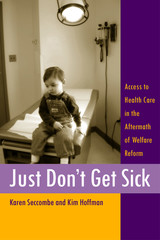
Drawing upon statistical data and in-depth interviews with over five hundred families in Oregon, Karen Seccombe and Kim Hoffman assess the ways in which welfare reform affects the well-being of adults and children who leave the program for work. We hear of asthmatic children whose uninsured but working mothers cannot obtain the preventive medicines to keep them well, and stories of pregnant women receiving little or no prenatal care who end up in emergency rooms with life-threatening conditions.
Representative of poor communities nationwide, the vivid stories recounted here illuminate the critical relationship between health insurance coverage and the ability to transition from welfare to work.
READERS
Browse our collection.
PUBLISHERS
See BiblioVault's publisher services.
STUDENT SERVICES
Files for college accessibility offices.
UChicago Accessibility Resources
home | accessibility | search | about | contact us
BiblioVault ® 2001 - 2024
The University of Chicago Press









